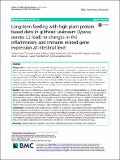Por favor, use este identificador para citar o enlazar a este item:
http://hdl.handle.net/10261/170695COMPARTIR / EXPORTAR:
 SHARE SHARE
 CORE
BASE CORE
BASE
|
|
| Visualizar otros formatos: MARC | Dublin Core | RDF | ORE | MODS | METS | DIDL | DATACITE | |

| Título: | Long-term feeding with high plant protein based diets in gilthead seabream (Sparus aurata, L.) leads to changes in the inflammatory and immune related gene expression at intestinal level |
Autor: | Estruch, Guillem; Collado, María Carmen CSIC ORCID; Monge-Ortiz, Raquel; Tomás-Vidal, Ana; Jover-Cerdá, Miguel; Peñaranda, David S; Pérez Martínez, Gaspar CSIC ORCID ; Martínez-Llorens, Silvia | Palabras clave: | Gilthead seabream Vegetable meal Squid meal Krill meal Intestine Histology Gene expression |
Fecha de publicación: | 3-oct-2018 | Editor: | BioMed Central | Citación: | BMC Veterinary Research 14(1): 302 (2018) | Resumen: | [Background]: In order to ensure sustainability of aquaculture production of carnivourous fish species such as the gilthead seabream (Sparus aurata, L.), the impact of the inclusion of alternative protein sources to fishmeal, including plants, has been assessed. With the aim of evaluating long-term effects of vegetable diets on growth and intestinal status of the on-growing gilthead seabream (initial weight = 129 g), three experimental diets were tested: a strict plant protein-based diet (VM), a fishmeal based diet (FM) and a plant protein-based diet with 15% of marine ingredients (squid and krill meal) alternative to fishmeal (VM+). Intestines were sampled after 154 days. Besides studying growth parameters and survival, the gene expression related to inflammatory response, immune system, epithelia integrity and digestive process was analysed in the foregut and hindgut sections, as well as different histological parameters in the foregut. [Results]: There were no differences in growth performance (p = 0.2703) and feed utilization (p = 0.1536), although a greater fish mortality was recorded in the VM group (p = 0.0141). In addition, this group reported a lower expression in genes related to pro-inflammatory response, as Interleukine-1β (il1β, p = 0.0415), Interleukine-6 (il6, p = 0.0347) and cyclooxigenase-2 (cox2, p = 0.0014), immune-related genes as immunoglobulin M (igm, p = 0.0002) or bacterial defence genes as alkaline phosphatase (alp, p = 0.0069). In contrast, the VM+ group yielded similar survival rate to FM (p = 0.0141) and the gene expression patterns indicated a greater induction of the inflammatory and immune markers (il1β, cox2 and igm). However, major histological changes in gut were not detected. [Conclusions]: Using plants as the unique source of protein on a long term basis, replacing fishmeal in aqua feeds for gilthead seabream, may have been the reason of a decrease in the level of different pro-inflammatory mediators (il1 β, il6 and cox2) and immune-related molecules (igm and alp), which reflects a possible lack of local immune response at the intestinal mucosa, explaining the higher mortality observed. Krill and squid meal inclusion in vegetable diets, even at low concentrations, provided an improvement in nutrition and survival parameters compared to strictly plant protein based diets as VM, maybe explained by the maintenance of an effective immune response throughout the assay. |
Versión del editor: | https://doi.org/10.1186/s12917-018-1626-6 | URI: | http://hdl.handle.net/10261/170695 | DOI: | 10.1186/s12917-018-1626-6 | E-ISSN: | 1297-9716 |
| Aparece en las colecciones: | (IATA) Artículos |
Ficheros en este ítem:
| Fichero | Descripción | Tamaño | Formato | |
|---|---|---|---|---|
| 12917_2018_Article_1626.pdf | 4,94 MB | Adobe PDF |  Visualizar/Abrir |
CORE Recommender
PubMed Central
Citations
16
checked on 10-abr-2024
SCOPUSTM
Citations
43
checked on 17-abr-2024
WEB OF SCIENCETM
Citations
41
checked on 26-feb-2024
Page view(s)
309
checked on 22-abr-2024
Download(s)
212
checked on 22-abr-2024

